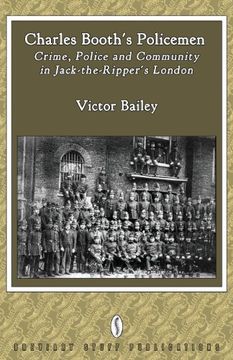Share
Charles Booth's Policemen: Crime, Police and Community in Jack-The-Ripper's London
Victor Bailey
(Author)
·
Breviary Stuff Publications
· Paperback
Charles Booth's Policemen: Crime, Police and Community in Jack-The-Ripper's London - Bailey, Victor
Choose the list to add your product or create one New List
✓ Product added successfully to the Wishlist.
Go to My Wishlists
Origin: U.S.A.
(Import costs included in the price)
It will be shipped from our warehouse between
Friday, July 19 and
Friday, July 26.
You will receive it anywhere in United Kingdom between 1 and 3 business days after shipment.
Synopsis "Charles Booth's Policemen: Crime, Police and Community in Jack-The-Ripper's London"
What explains the law-abidingness of late Victorian England? A number of modern historians contend that the answer lies with the effectiveness of policing, and with the imposition of a 'policeman-state' in Victorian and Edwardian England. Exploiting the vast archive that Charles Booth amassed for his leviathan social investigation to explore the social order of London's East End, Life and Labour of the People in London, this volume takes issue with this answer. The East End was notorious as a region of unalleviated poverty, crime and immorality, the district where the issue of large-scale Jewish immigration was first confronted, and where Jack-the-Ripper found his victims. Victor Bailey reveals that historians have overestimated the extent to which policemen were able or willing to intervene in the daily behaviour of inhabitants to suppress law breaking. He shows that the commission and repression of crime were linked not only to the structures of law enforcement but also to levels of community solidarity, associational life, family integration, and parental authority. Social order was a function less of policing than of a complex combination of informal family and community sanctions, the mixed welfare of charity and state support, the new board schools, slum clearance, and the negotiated justice of the magistrates' courts. The conclusions should lead us to question the role of the state in the making of social order, and to reinstate the force of informal social sanctioning.
- 0% (0)
- 0% (0)
- 0% (0)
- 0% (0)
- 0% (0)
All books in our catalog are Original.
The book is written in English.
The binding of this edition is Paperback.
✓ Producto agregado correctamente al carro, Ir a Pagar.

